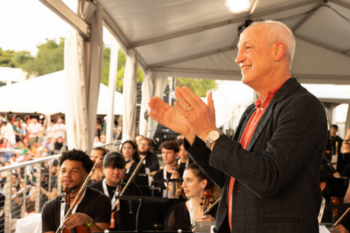
The Rolling Stones, Lucinda Williams, Taj Mahal and Steve Earle are among the guest musicians who recorded songs for a new tribute album to zydeco legend Clifton Chenier. “A Tribute to the King of Zydeco” features those musicians along with a number of South Louisiana greats covering classic Chenier songs in celebration of what would have been the pioneer’s 100th birthday.
“A Tribute to the King of Zydeco” will be released June 27 on Joel Savoy’s Valcour Records, and the label has released the album’s first single, “Release Me,” featuring Williams, swamp pop icon Tommy McClain and accordion master Keith Frank. Take a listen to the song below.
“It’s pretty incredible when you start a project like this, how word gets out and people come to you wanting to be a part of it,” says Savoy, a Cajun musician whose parents are Marc and Ann Savoy. “Everybody loved Clifton and his music, and so many people were touched by it.”
Chenier was born in Opelousas on June 25, 1925, and his father, Joseph, taught a young Clifton to play the accordion. As he grew into his own as a regular musician at South Louisiana house parties and dances, Chenier developed a style that blended French Creole La La music with R&B and blues and Cajun influences. And his 1954 recordings of “Louisiana Stomp” and “Clifton’s Blues” are seen as some of the earliest recorded examples of what would become known as zydeco.
Chenier won a Grammy Award in 1983 for his album “I’m Here!,” and the next year the National Endowment for the Arts named him a National heritage Fellow.
Chenier died in December 1987 at the age of 62.
After Clifton’s passing, his son C.J. Chenier took over leadership of Clifton’s band. The accordionist and vocalist often pays tribute to his father on stage, and he appears on two tracks on “Tribute to the King of Zydeco,” performing on “I’m Coming Home” with blues guitarist Sonny Landreth and “Hot Rod” with David Hidalgo of the band Los Lobos.
The Rolling Stones and Cajun musician Steve Riley open “A Tribute to the King of Zydeco” with Chenier’s genre-naming song “Zydeco Sont Pas Sale” — and yes, Mick Jagger sings in French Creole. The Stones have rarely, if ever, contributed to this kind of tribute album, which demonstrates Chenier’s importance and the interest the band has had in American blues and folk music, says swamp rocker C.C. Adcock, who brought British giants onboard and produced the tracks “Zydeco Sont Pas Sales” and “Release Me.”
“We all got into a lot of cool music through the backdoor of The Rolling Stones and rock ‘n’ roll. And there’s another moment to do that here,” Adcock says. “The Stones being involved and them crowing about it is a way for some kid in Brazil to learn about zydeco and learn about Clifton.”
“A Tribute to the King of Zydeco” also includes Taj Mahal and Keith Frank performing on Chenier’s 1955 hit “Hey, ’tite Fille”; country musician Charley Crockett and Zydeco Cha Chas leader Nathan Williams Sr. playing “Easy Easy Baby”; and pianist Marcia Ball and accordionist Geno Delafose on “I May Be Wrong.”
The 14-track album was produced by Savoy and Steve Berlin, a longtime member of Los Lobos. John Leopold, the former managing director of the Arhoolie Foundation — the Arhoolie record label importantly released many of Chenier’s recordings — executive produced the album. Adcock produced “Zydeco Sont Pas Sales” and “Release Me.”
Savoy and Berlin brought together musicians Roddie Romero, Eric Adcock, Derek Huston, Lee Allen Zeno, Jermaine Prejean and Sherelle Chenier Mouton as the house band to back the guest artists on most of the tribute album. They’ve been dubbed the Dockside Allstars in a nod to their time recording the album at the studio out in Maurice.
“I immediately realized how important [this project] would be as a record and how I had to make sure that the correct people were involved in this,” Savoy says. “Because it wasn’t about me. It wasn’t about Steve. It wasn’t about Arhoolie. Instantly the weight on my shoulders was figuring out how to do this right. And I felt like there was one right way, and it was to bring as many of these zydeco legacy families onto the project as possible and get support from the zydeco community. I feel like we did a great job in accomplishing that.”
On Friday, May 2, the Dockside Allstars will back C.J. Chenier, Sonny Landreth, Marcia Ball, Curley Taylor and surprise guests during a Clifton Chenier centennial show at the New Orleans Jazz & Heritage Festival. They play at 5:50 p.m. on the Fais Do-Do Stage.
There also will be an exhibit about Chenier in the Grandstand during Jazz Fest organized by the New Orleans Jazz Museum. “The King at 100” includes rare photos, archival materials and personal items, including Chenier’s accordion, stage outfits and his King of Zydeco crown.
In a couple of months, Valcour Records and Smithsonian Folkways will mark Chenier’s birthday with a 7-inch single release pairing The Rolling Stones’ version of “Zydeco Son Pas Sales” with Chenier’s original recording. There also are plans for Smithsonian Folkways, which now controls the Arhoolie catalog, to release a historical boxset later this year.
Proceeds from the sale of “A Tribute to the King of Zydeco” will benefit the Clifton Chenier Memorial Scholarship at the University of Louisiana Lafayette. The new scholarship fund will support ULL students studying traditional music, specifically zydeco accordion.
“These artists on this project were personally inspired and influenced by Clifton,” Savoy says. “I hope the participation of these artists will introduce their fanbase to not only to discover Clifton’s music, but I’d love for them also to dive deeper into the soulful origins of this music.”
Pre-orders for “A Tribute to the King of Zydeco” and a link to support the Clifton Chenier Memorial Scholarship are now open. Find more at linktr.ee/valcourrecords.

